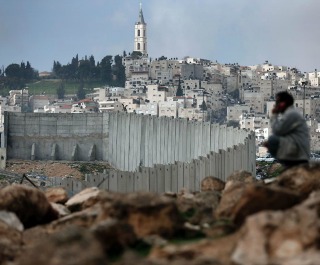Unauthorized settlements dot hilltops in the West Bank, and anti-settlement groups and Palestinians say
retroactively legalizing them is a methodical effort to change the region’s map.
ISABEL KERSHNER
MITZPE DANNY, West Bank — One night in the fall of 1998, a self-professed “outpost entrepreneur” brought three
trailers to a rugged hilltop in the Israeli-occupied West Bank and established his first
pirate settlement.
Dozens of youthful supporters came to cheer on the entrepreneur, Shimon Riklin, whose wife, newborn and toddler
joined him a few days later. A second family also moved in. To their initial surprise, nobody from the military or
government came to remove them. “After six months,” Mr. Riklin said in a recent interview, “I understood it was a
done deal.”
They named their outpost Mitzpe
Danny, after a British immigrant stabbed to
death by a Palestinian at the settlement across the highway, and went on over
the next few months to help establish Mitzpe Hagit and then Neve Erez a short drive away. “I jumped from hill to
hill,” Mr. Riklin said.
Today, more than 40 Orthodox Jewish families live in Mitzpe Danny, one of a string of outposts on a strategic ridge
with breathtaking views southwest to Jerusalem’s Mount of Olives
and east all the way to Jordan. They are part of an expansive network of about 100 outposts established mostly over
the past two decades without government authorization.
At least one-third of these have either been retroactively legalized or — like Mitzpe Danny — are on their way, in
what anti-settlement groups that track the process see as a quiet but methodical effort by the government to change
the map of the West Bank, now in its 50th year under Israeli
occupation, by entrenching the outposts that spread like fingers across it.
Continue
Reading
 With the election of Donald Trump as the next president of the United States, speculation is
running high in regard to Washington’s policy on Israeli settlement construction and the future of the Middle
East peace process.
With the election of Donald Trump as the next president of the United States, speculation is
running high in regard to Washington’s policy on Israeli settlement construction and the future of the Middle
East peace process.
 On October 21, the Israeli Hebrew-language daily Yedioth Ahronoth published a
On October 21, the Israeli Hebrew-language daily Yedioth Ahronoth published a  On a trip to Israel last month, I visited a friend who runs a small store in downtown Jerusalem,
my hometown. Outside, on the street, there were dozens of young American Birthright tourists. “Business must be
hopping, with all these Birthrighters,” I said. “Not quite,” my friend replied. “Their parents send them here
with pocket money, but stay home in the U.S., with their credit cards.”
On a trip to Israel last month, I visited a friend who runs a small store in downtown Jerusalem,
my hometown. Outside, on the street, there were dozens of young American Birthright tourists. “Business must be
hopping, with all these Birthrighters,” I said. “Not quite,” my friend replied. “Their parents send them here
with pocket money, but stay home in the U.S., with their credit cards.”
